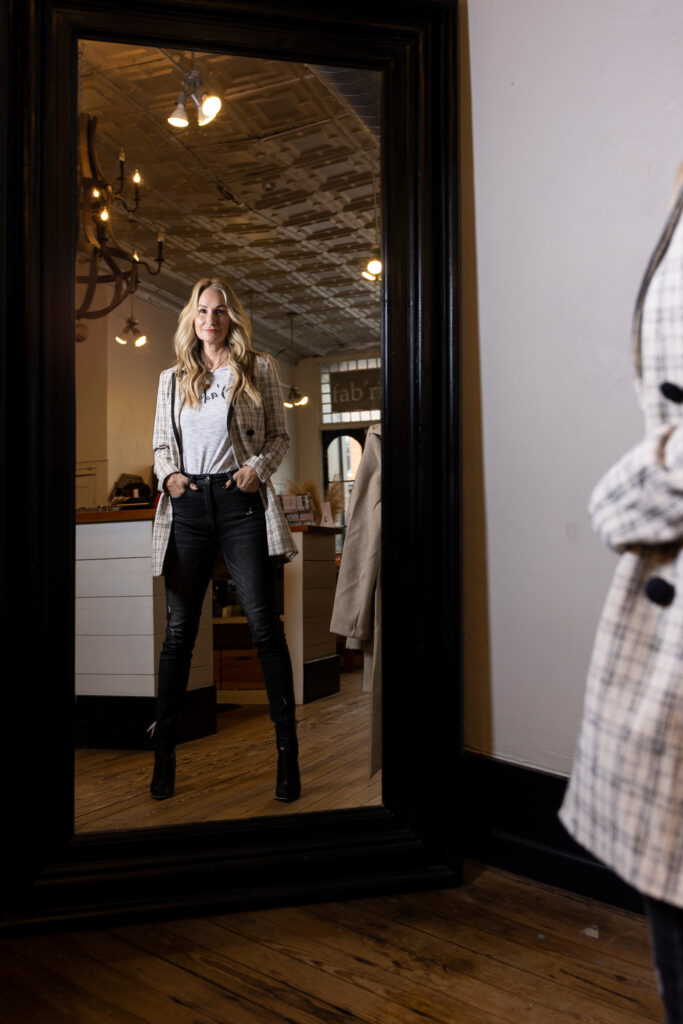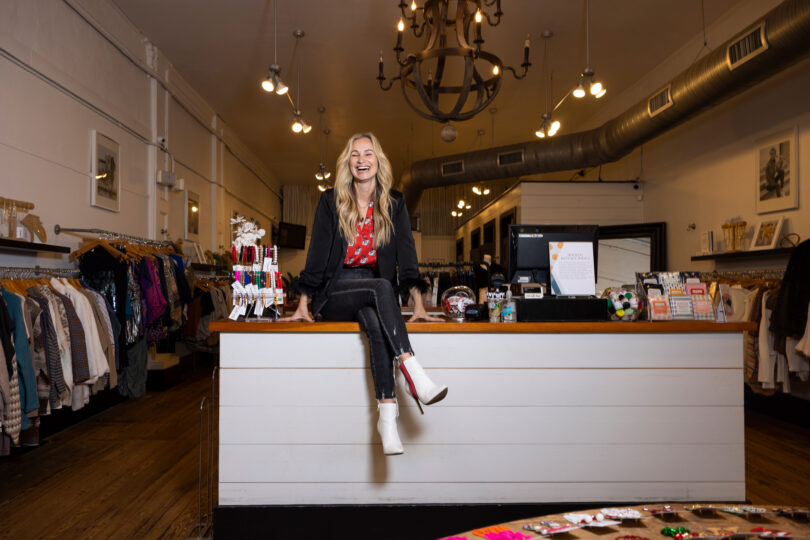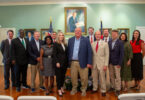The night the first fab’rik opened in 2002 was a raging success.
Customers swarmed the Atlanta clothing boutique where everything is under $100 in the best way, with hundreds lining the sidewalk outside waiting for a chance to get in the doors. Founder and CEO Dana Spinola saw years of coffee-fueled days starting to really pay off.
She went home that night and slept soundly for the first time in a long time. The next day, fab’rik would open to the public, and Spinola BBA ’96 herself would greet shoppers at the door, decked out in some of the store’s finest.
That’s when it all quite literally came crashing down.
“As I’m pulling into the store, I see the windows are shattered and glass is everywhere,” Spinola remembers. “I walked in, and everything was gone. Not just the clothing. They took the register, the stereo system, the lighting, everything off the mannequins. Nothing was left except a few coat hangers.”
Spinola sunk to the floor in utter disbelief. Everything she’d been working to build in a year, gone in one night.
But when she called her dad, a seasoned entrepreneur himself, he had some tough love for her.
“He didn’t laugh, but he said, ‘Welcome to owning your own business, sweetheart,’” Spinola says with a laugh. Spinola thought she had become a business owner the night before. But that morning, broom in hand and nailing up temporary plywood to thwart more crooks, that’s when the reality of being an entrepreneur set in.
So Spinola did what she always does. She went to work.
After cleaning up the store, she convinced the vendors who’d given her clothing to sell to send replacements, promising that she’d sell everything in the next 30 days. And she did.
“When I coach people on owning their own business, I don’t sit down with anyone and say, ‘Guess what. You’re going to have 40 stores in a couple of years, and one day the work will be done,” says Spinola, referencing the ever-growing number of fab’rik franchises across the country. “What happens is you put grit into your business every day for the rest of your life. It will grow, and your vision will grow because of the people that believe in it.”
Spinola didn’t plan on having dozens of stores in as many states when she first opened her doors. “One store was a lot and enough,” she laughs.
But her customers started calling, demanding more fab’riks in new locations.
“They’d say, ‘I was just in Raleigh, and I forgot my dress for a wedding. And you don’t even have a fab’rik there. This is ridiculous!’” Spinola says. “I didn’t know how to handle that in the beginning. I’m just like, ‘I’m sorry?’”
Her business degree kicked in. “This is supply and demand,” she thought at the time. So Spinola began franchising stores in a very strategic way.
“I wanted character, not the same thing at every store,” she says. “So I found women that know Athens, that know Austin, that have roots and wanted to build a business of their own and make an impact in their community while having the flexibility to start a family and grow that way—with women, like me, that loved high style and had heart. This type of growth was never the initial plan; it’s grown beyond anything I could have ever imagined.”
In the Athens store, for example, shop owner Melissa Ripley BCFCS ’11 stocks oversized sweatshirts embroidered with a surprisingly subtle sequined bulldog alongside an impressive selection of red-and-black earrings. But alongside the vintage-inspired Georgia Bulldog T-shirts are everyday essentials, the kinds of clothes women reach for day after day.
These foundational pieces can make or break the versatility of a woman’s wardrobe, and they don’t always come cheap. But at fab’rik, Spinola makes sure the average woman can walk out of the store without busting open their piggy banks and still be treated with superb customer service.
I wanted character, not the same thing at every store. So I found women that know Athens, that know Austin, that have roots and wanted to build a business of their own and make an impact in their community while having the flexibility to start a family and grow that way—with women, like me, that loved high style and had heart.” Dana Spinola BBA ’96, founder and CEO of fab’rik
In 2009, Spinola expanded the brand to also include a nonprofit branch called free fab’rik, which builds free boutiques in women’s shelters and safe houses. The “stores” have all the same charm as the retail fab’riks—white walls, beautiful rugs, mannequins, fashion books, even a chandelier—but all the clothing is free. Survivors choose complete outfits (shoes and accessories included) from the racks with fashion advice from volunteer stylists without the price tags.
Free fab’rik hosts these shopping sprees for a variety of organizations serving survivors of human trafficking and domestic violence weekly at their free boutiques to remind these women that their community cares.
“At these events, you hear stories that break your heart, but you also see the power of an outfit,” Spinola says. “You know, when a woman says, ‘This is the outfit I’m going to wear to court to get custody of my son,’ and then you call the safehouse two weeks later and she got him back—do I believe it was the outfit? No. But I do believe in the confidence the outfit gave her.
“At fab’rik, we believe that while clothes can’t change the world, the women who wear them can because we watch it happen day after day, and it is absolutely one of the most important and beautiful things we do.”

“When I coach people on owning their own business, I don’t sit down with anyone and say, ‘Guess what. You’re going to have 40 stores in a couple of years, and one day the work will be done. What happens is you put grit into your business every day for the rest of your life. It will grow, and your vision will grow because of the people that believe in it.” (Photo by Chamberlain Smith/UGA)








